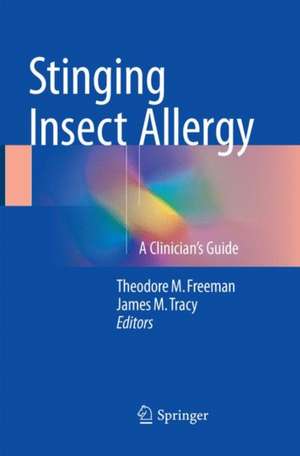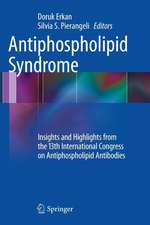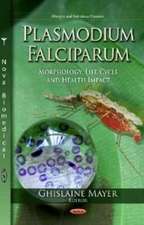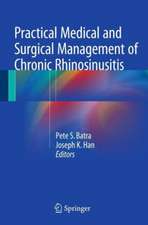Stinging Insect Allergy: A Clinician's Guide
Editat de Theodore M. Freeman, James M. Tracyen Limba Engleză Paperback – 12 aug 2018
In addition, multiple chapters address the overlap of Hymenoptera allergy as practiced in North America and Europe, as well as other sciences. Final chapters cover the impact ecology is having on insect allergy; and the impact insect allergy is having on other areas of medicine, such as mast cell disorders. Stinging Insect Allergy: A Clinician’s Guide is an ideal resource for medical students, residents, allergists, and general practitioners alike, and also serves as an important reference text for any practitioner of allergy and immunology who desires a complete picture of Hymenoptera and non-Hymenoptera insect allergy.
| Toate formatele și edițiile | Preț | Express |
|---|---|---|
| Paperback (1) | 590.88 lei 38-44 zile | |
| Springer International Publishing – 12 aug 2018 | 590.88 lei 38-44 zile | |
| Hardback (1) | 916.14 lei 3-5 săpt. | |
| Springer International Publishing – 17 iul 2017 | 916.14 lei 3-5 săpt. |
Preț: 590.88 lei
Preț vechi: 621.98 lei
-5% Nou
Puncte Express: 886
Preț estimativ în valută:
113.08€ • 117.62$ • 93.35£
113.08€ • 117.62$ • 93.35£
Carte tipărită la comandă
Livrare economică 10-16 aprilie
Preluare comenzi: 021 569.72.76
Specificații
ISBN-13: 9783319834641
ISBN-10: 3319834649
Pagini: 321
Ilustrații: X, 321 p. 45 illus., 41 illus. in color.
Dimensiuni: 155 x 235 mm
Ediția:Softcover reprint of the original 1st ed. 2017
Editura: Springer International Publishing
Colecția Springer
Locul publicării:Cham, Switzerland
ISBN-10: 3319834649
Pagini: 321
Ilustrații: X, 321 p. 45 illus., 41 illus. in color.
Dimensiuni: 155 x 235 mm
Ediția:Softcover reprint of the original 1st ed. 2017
Editura: Springer International Publishing
Colecția Springer
Locul publicării:Cham, Switzerland
Cuprins
Preface.- Part 1.- 1. History of Hymenoptera Allergy.- 2. Entomological Aspects of Insect Sting Allergy.- 3. Hymenoptera Venoms: Toxicity, Components, Stability and Standardization.- 4. Clinical Aspects of Hymenoptera Allergy: IgE Response Stings and Immunotherapy.- 5. Diagnostic In Vivo and In Vitro Methods in Insect Allergy.- 6. Pathologic Findings in Hymenoptera Sting Fatalities.- 7. Treatment of Hymenoptera Reactions: Acute and Prophylactic.- 8. Adverse Reactions to Skin Testing and Immunotherapy with Hymenoptera Venoms and Whole Body Extracts.- 9. Duration of Venom Immunotherapy.- Part 2.- 10. Unique Aspects of Bee Allergy and Reactions.- 11. The Imported Fire Ant: The United States Experience.- 12. Mosquito Hypersensitivity: Clinical Updates.- 13. Allergic Reactions to Biting Insects.- 14. Arthropods and Human Diseases.- Part 3.- 15. Behavior, Ecology, Natural History and Distribution of Stinging Hymenoptera.- 16. Insect Sting Allergy and Mast Cell Disease.- 17. Current Remaining Questions.
Notă biografică
Theodore M. Freeman, MD is a Retired US Air Force Colonel; Medical Director, Medical Lab Lifecare Hospital of San Antonio (within The South Texas Medical Center); Physician, San Antonio Asthma and Allergy Clinic San Antonio, TX, USA; and Current Immediate Past President, Texas Allergy Asthma and Immunology Society. He also serves on the Editorial Board, Annals Allergy Asthma and Immunology, and on the Board of Directors, American Board of Allergy and Immunology.
James M. Tracy, DO is Managing Partner Allergy, Asthma & Immunology Associates, P.C. Omaha, NE, USA; Adjunct Associate Clinical Professor, Department of Pediatrics, University of Nebraska College of Medicine Omaha, NE, USA; Assistant Clinical Professor, Department of Internal Medicine Division of Allergy & Immunology, Creighton University School of Medicine Omaha, NE, USA. He is also Past Chairman, Insect Allergy Section, American Academy of Allergy, Asthma & Immunology (AAAAI). He is also Past Chairman, Insect Allergy Section, American Academy of Allergy, Asthma & Immunology (AAAAI) and is a Regent on the Board of Regents for the American College of Allergy, Asthma and Immunology.
Textul de pe ultima copertă
This comprehensive book thoroughly covers the field of stinging insect allergy; addressing all clinical aspects, including diagnosis and therapeutic recommendations. Stinging Insect Allergy: A Clinician’s Guide begins with a look into the entomologic aspects of Hymenoptera insects (bees, vespids, wasps and ants), which cause nearly all the IgE mediated reactions due to insects. Further chapters single out and examine the unique aspects of common Hymenoptera species, such as bees and fire ants, in rich detail. Later chapters clinically review what is known about non-Hymenoptera biting insects, such as mosquitoes.
In addition, multiple chapters address the overlap of Hymenoptera allergy as practiced in North America and Europe, as well as other sciences. Final chapters cover the impact ecology is having on insect allergy; and the impact insect allergy is having on other areas of medicine, such as mast cell disorders. Stinging Insect Allergy: A Clinician’s Guide is an ideal resource for medical students, residents, allergists, and general practitioners alike, and also serves as an important reference text for any practitioner of allergy and immunology who desires a complete picture of Hymenoptera and non-Hymenoptera insect allergy.
In addition, multiple chapters address the overlap of Hymenoptera allergy as practiced in North America and Europe, as well as other sciences. Final chapters cover the impact ecology is having on insect allergy; and the impact insect allergy is having on other areas of medicine, such as mast cell disorders. Stinging Insect Allergy: A Clinician’s Guide is an ideal resource for medical students, residents, allergists, and general practitioners alike, and also serves as an important reference text for any practitioner of allergy and immunology who desires a complete picture of Hymenoptera and non-Hymenoptera insect allergy.
Caracteristici
Written by experts in the field First comprehensive text on stinging insect allergy in over twenty five years Outlines the differences between the best practices in stinging insect allergy treatment in the United States, as opposed to the best practices in Europe Includes supplementary material: sn.pub/extras









